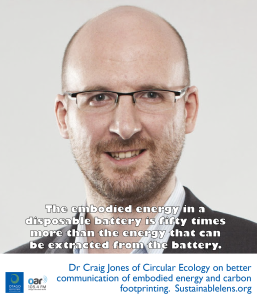The embodied energy in a disposable battery is fifty times more than the energy that can be extracted from the battery.
Dr Craig Jones of Circular Ecology is a leader in embodied energy and carbon footprinting of products, services and buildings, and in Life Cycle Analysis (LCA). Is is the author of the Inventory of Carbon & Energy an embodied energy and carbon database, and wrote the first book on embodied carbon in the construction industry. Circular Ecology, he tells us, comes from mixing circular economics with industrial ecology.
Talking points
Many kids start out with an environmental passion, but he older they get it just sort of disappears from them – they just get used to how society works at the moment – buy things, dispose of things, not really thinking about them.
It is disappointing that they don’t teach more about the environment and sustainability in engineering.
Engineering, design, is responsible for the products we have. It is a great opportunity to reduce the environmental impact of all the products that we use.
They (engineering graduates) don’t know enough about how to reduce impacts of products, and they just don’t have training and education to know how to do that.
It’s not the culture of companies to reduce impacts unless embedded in policies – which is not yet mainstream.
If you don’t take the opportunity when you design a building to reduce the embodied carbon then that opportunity is lost forever.
The embodied carbon, in a very short time frame, you are using 15-20 years worth of operational emissions. If you don’t take the opportunity to reduce that carbon you can’t go back, that opportunity has been lost forever.
We have the technology today – it is not really a technical issue.
It takes more energy to make a kilogram of paper than a kilogram of steel
Even though I prefer to read reports and documents on paper, I print about nothing these days – you do get used it.
Even as someone who does this full time, what’s a kilogram of carbon really? It is a difficult unit to understand, so I try to consider it in terms of units that are a bit more meaningful…if you did things differently, what is the saving in terms of other things that you do: driving the car or watching TV?
I think water footprints could quickly get more attention.
Too many people confuse carbon footprint with sustainability, and too many people confuse environmental benefits with sustainability.
True sustainability balances environmental factors with social factors and with economic factors.
If you are starting from nothing, then carbon and energy is a good place to start. But it shouldn’t be displayed or marketed as sustainability. Climate Change is one of the more pressing challenges we have at the moment, but there are other important issues out there: toxicity; eutrophication; inequality…
We need to look after our planet so we can hand it down to our children and our grandchildren. For them to have the same quality of life that we have had then we need to change – the planet needs to be healthy for that to happen.
There are so many environmental labels, it needs to be simplified and should be officially backed.
If all manufacturers of similar products had to adhere to the same label, the same assessment method, there would be nowhere to hide, you couldn’t hide behind creating your own label and doing it differently.
At the moment, most consumers don’t understand the impacts – their products are disconnected from the consequences – so the masses will just ignore those labels.
Recycling is not a benefit, it should be expected rather than congratulated.
If we are to live in a truly sustainable manner we need to stop congratulating ourselves for doing things that should be expected.
It needs to become an expectation, we should feel guilty for throwing away that plastic bottle or tin can.
If you recycle your tin can, that saves enough energy to power your TV for four hours.
The life span of a tin can is two months – from mining to discarding – so even with a 55% recycling rate, most of it is going to landfill.
A circular economy means New business models that are still profitable for companies
The embodied energy in a battery is fifty times more than the energy that can be extracted from the battery.
There are companies doing sustainability properly and they are making a profit. But it is not yet seen as mainstream. Those companies have the advantage of being ahead of the curve.
There is an opportunity for consumers, but there’s not really enough information in an easily digestible form.
(Activist) No. I do try achieve gains through my day-time job. And through giving out information freely.
(Motivation) Environmental gain.
(Challenges) There are more and more people in this area, it is becoming competitive. Reducing the costs of the assessments, especially on whole product lines.
(Miracle) Something in policy and legislation that mandated companies to measure and reduce the environmental footprints of their products, buildings and services.
(Advice) Everyone does have a choice when they buy things. You don’t have to always make that choice, other things come into it, but now and again just think about the environmental impacts of something when you purchase it. And even, think do I need that? Quite often you buy things and they end up at the bottom of the cupboard. Think about that, and it reduces the amount of things you buy and never use.
This conversation was recorded at the very pleasant Bordeaux Quay alongside Bristol’s historic Floating Harbour in September 2014.

